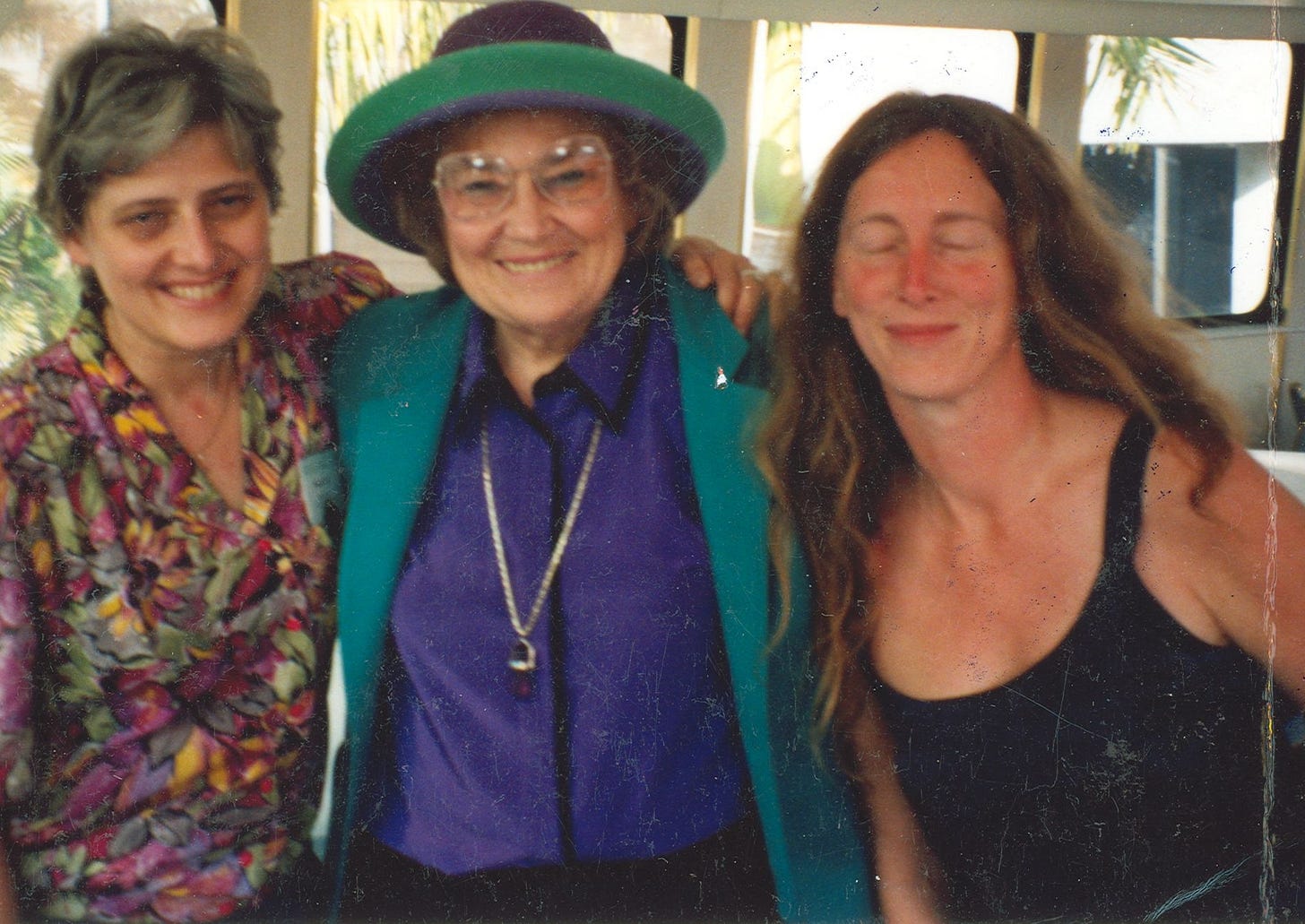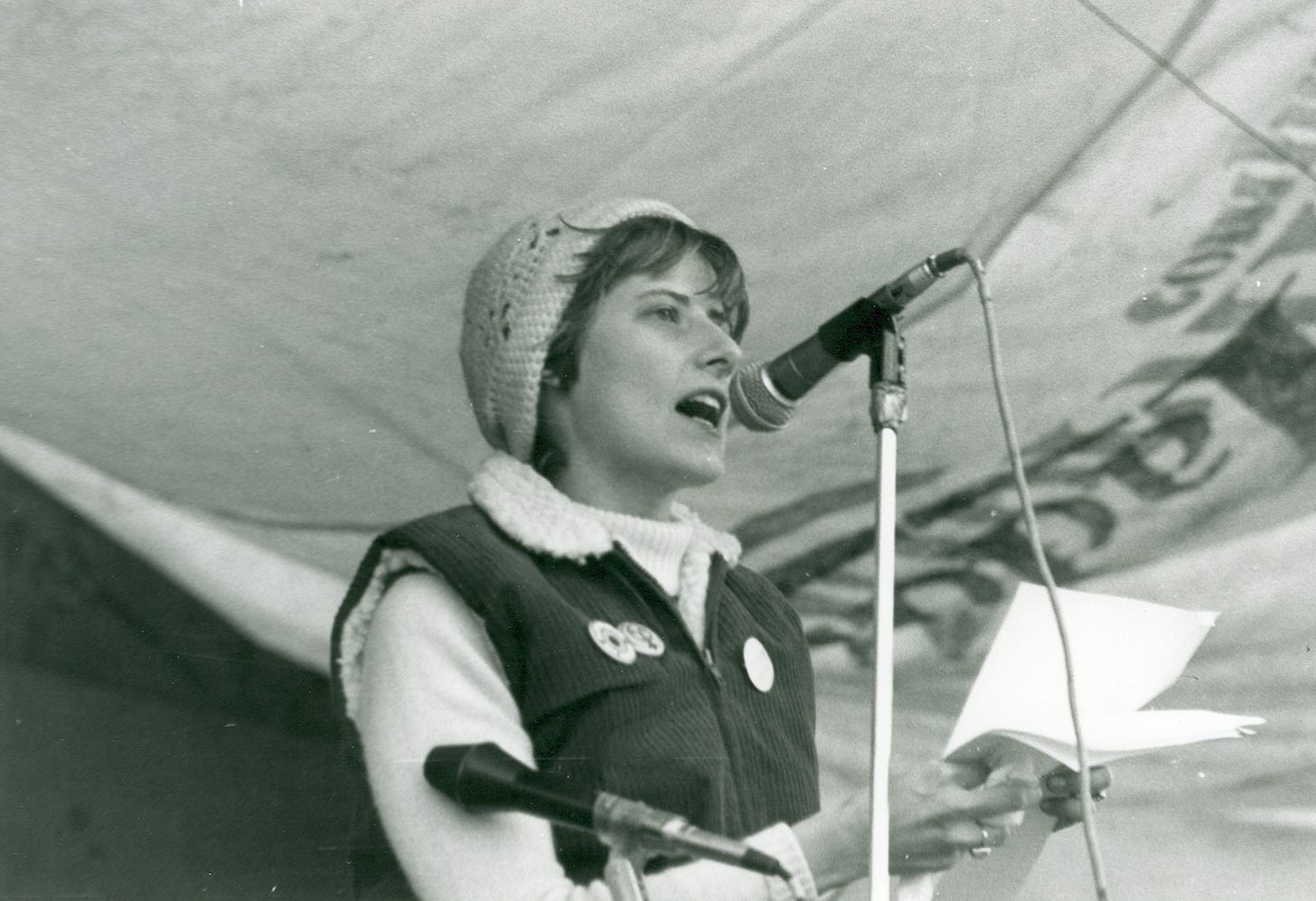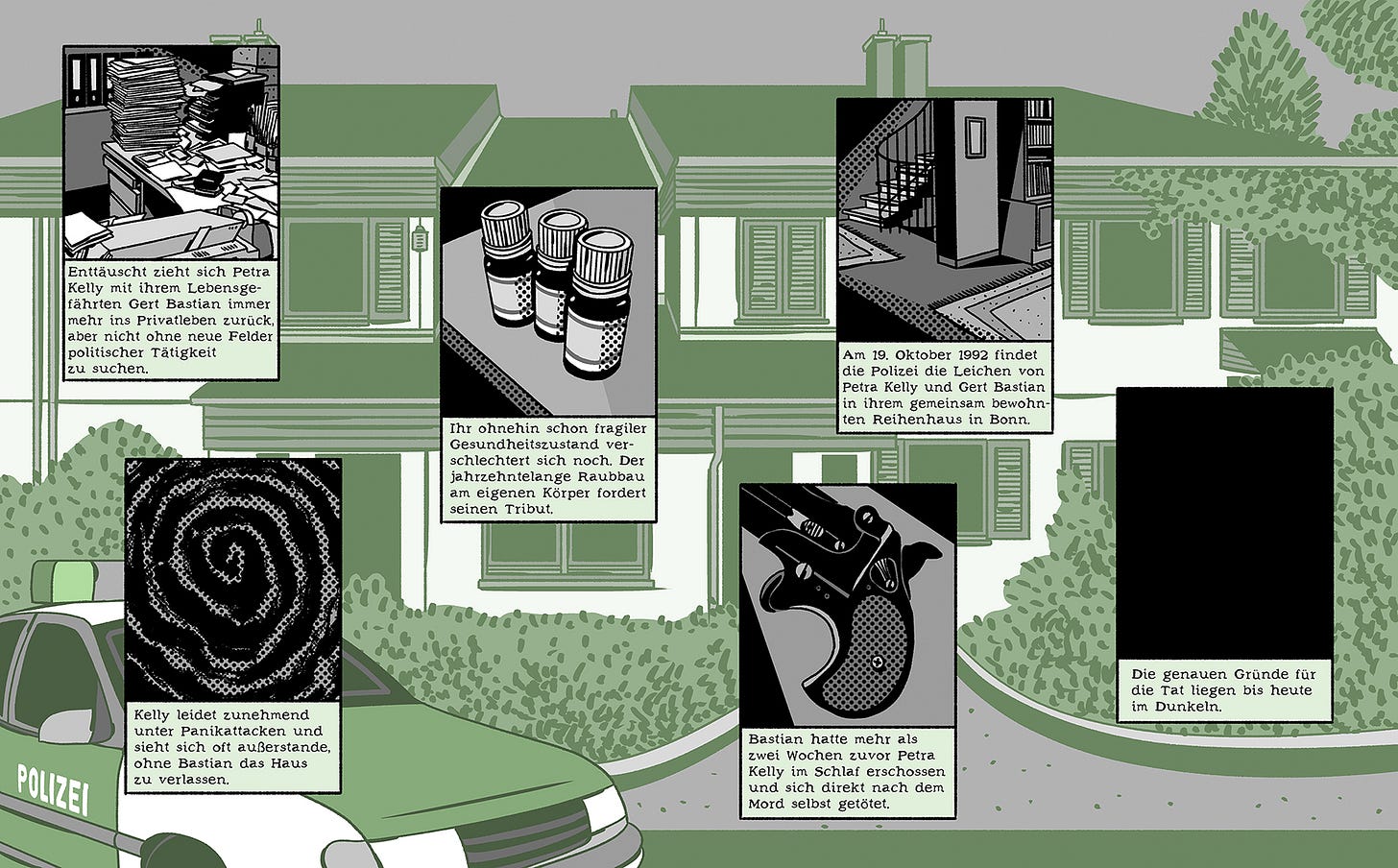Today Petra Kelly would have turned 75
Co-founder and icon of the German Greens: 30 years after her murder
Petra Kelly was shot dead by her life partner, former NATO general Gerd Bastian, in early October 1992. The exact date is uncertain, as the bodies of Petra Kelly and Gerd Bastian were not found until October 19, 1992 - more than two weeks after the crime.
The women’s, peace and environmental activist was born as Petra Lehmann on November 29, 1947 in Bavaria. After her mother's marriage in 1959 to John Edward Kelly, a U.S. soldier stationed in Germany, her family name changed to Kelly. stationed in Germany, her family name changed to Kelly. That same year, the family moved to Columbus, Georgia. Petra studied political science at American University in Washington, D.C. She was a member of the student council, organized political seminars and lectures, and participated in demonstrations against the Vietnam War and racial segregation. In the process, she learned about the political culture in the US and the nonviolent protest of the civil rights movement. Her role models included Mahatma Gandhi and Martin Luther King Jr. Her entry into practical politics followed with the 1968 U.S. presidential campaign, in which she campaigned for Senator Robert F. Kennedy and his vice presidential candidate, Hubert H. Humphrey.

The environmental, women’s and peace activist Eva Quistorp was Petra Kelly’s longtime political companion. A theologian by training, Quistorp represented the German Greens in the European Parliament from 1989 to 1994, was a member of the Green Party’s federal executive committee and co-founder of the Green Heinrich Boell Foundation. She commemorates Petra Kelly in a very personal letter.
“Missing you!” – A personal letter
Dear Petra,
I am not the only one who is missing you very much, you are missed by many in this country and around the world. Especially now, when Putin’s power apparatus is waging a brutal war against Ukraine. You are also missed by Russian feminists, who dare to take non-violent actions against the war of Putin’s mafia.
Petra, your name, like Peter, reminds us of a rock: you were a rock on which the anti-nuclear weapons movement and the Greens were built throughout Europe. You were part of the awakening in the U.S. in the 1960s with the civil rights movement – which, with Martin Luther King, was also a peace movement against the power of the military-industrial complex and against the Vietnam War, which we protested in West Berlin and you protested in the U.S. with Robert Kennedy.
You held great speeches at the peace demonstrations in the 1980s in Bonn that I helped organize with the “Women for Peace”. Unfortunately, neither Georg Mascolo quotes you in his good articles in the South German Newspaper (Süddeutsche Zeitung) on nuclear weapons, nor Green foreign minister Annalena Baerbock in her UN speeches. You supported the women’s peace movement worldwide and, together with me, the women for peace in the GDR.
You are missed by many now, when we must insist in the UN on the implementation of Resolution 1325, which since 2000 has advocated the participation of women at all levels in peace negotiations. You did not live to see the founding of the women’s rights organization medica mondiale in Cologne in 1993, in which I participated as an MEP. Unfortunately. Since you also so wanted to help practically against the traumas of women and children in wars and terror.
Do you remember when we were together at the World Women’s Conference in Moscow in June 1987 – and with Helen Caldicott, our third-in-command since the anti-nuclear conference in Dublin, where we had met in 1978, daring to raise the health dangers of Chernobyl? The Soviet Women’s Federation allowed us to speak openly back then under Glasnost and Perestroika! What a contrast to the ban on the human rights organisation Memorial and the newspaper Nova Gazeta today. They – I’m sure you were happy to hear on your cloud – won the Nobel Peace Prize, along with oppositionists from Belarus and civil society in Ukraine.
You would have come to the vigils at the Brandenburg Gate for the Green Movement in Iran in 2009, which I helped organize. Also now you would have been there when Duezen Tükkal organized a demo for the women in Iran protesting against compulsary hijab and against the reactionary Islam theocracy and the corrupt elites in Iran and their murders and lies. You always wanted both: nuclear disarmament and full women’s rights. You were no stranger to criticism of religion as a liberal Catholic.
Myself, and many others, also miss you in the feminist debates of today on prostitution, hijabs for teachers, diversity, anti-discrimination and quotas. You clapped immediately when I was the first in Germany to call for a women’s quota at the founding party conference of the Green Party in my speech in Karlsruhe in January 1980. After that, we pushed it through in the first committees – long before the Greens’ women’s statute of 1986. We both talked about forced marriage and genital mutilation and women’s poverty, in conjunction with U.S. and French feminists.
We both invented the sunflower as the logo of the Greens with Roland Vogt, who was one of the trio of founders from the Federal Association of Citizens’ Initiatives for Environmental Protection (BBU) and the Young European Federalists (JeF). And we then gave the sunflower to the Greens as a gift. It wasn’t Josef Beuys, as a German Television (ZDF) film claimed the other day at the Green Party convention, along the lines that only famous men can invent famous logos and names. No. It was our trio, who – like tens of thousands of anti-nuclear activists – knew the logo of the designer from Denmark: “Atomkraft, nein danke! (“Nuclear power, no thanks!).
We suggested the name “The Greens” as if from the same mouth when Milan Horacek of Charter 77 told us that the left-wing party founding scene wanted to call themselves “The Alternative”. This reminded us of Rudolf Bahro’s important book against environmental destruction, but was too abstract for us. We felt the name “The Greens” was more sensual and related to spiritual traditions of hope. The Greens should have been more respectful of this gift from three party founders.
Instead, for the past 30 years, you have been almost forgotten in official speeches and media appearances by top Greens. And now you are rather used as an ornament, as it happens to many dead people who experienced competition and envy and intrigue during their lifetime. No quote from you and not even your name was mentioned at the big celebration of “40 years Greens” in early January 2020. Not even from Lukas Beckmann, who was the only founding Green to speak – along with Ströbele, Steinmeier and Luisa Neubauer, Annalena Baerbock, Robert Habeck.
And eight years earlier, at the funeral service in 1992, you and your murderer were remembered at the same time. I found that just as bad then as the silence in 2020. Later in the evening of the green anniversary celebration, slightly tipsy, I met Ina Deter, who hugged me in tears and called out “Eva , where is Petra? Why is no one talking about Petra?” This was overheard by a journalist of the weekly ZEIT (Time), but she probably couldn’t relate anymore to us two feminists from the era of the great peace movement and the founding period of the Greens.
What actions do you think you would have done in the last 30 years if you hadn’t gotten sick ? Something like the one at Alexanderplatz against the repression in the GDR or the one at the embassy in South Africa against the apartheid system ? Surely you would have been there at the climate demonstrations. Although you would have spoken out clearly for non-violence – as we did together in the 1980s. You would have made radical speeches, but you would have opposed extreme actions.
You were actually a Greta of your time. You also struck apocapytic tones from time to time and scolded on politics. Yes, even on the Greens, which you wanted to be an anti-party. You also got a lot of shitstorms back then and mean letters – there was no Twitter yet – from right-wing extremist milieu with the mail.
You didn’t want to rotate and give up your seat in parliament. But you wouldn’t have necessarily wanted more than eight years in the Bundestag either, which is normal for many Greens today. You wanted to go to a university in the U.S.A., you told me a few days before your murder, enthusiastically and full of life. You were unhappy with the Green Heinrich-Boell Foundation and the Green Party at the time, feeling abandoned and forgotten with your money troubles and with what you could contribute to the Greens.
But it was not you, but your life partner Gerd Bastian who seemed depressed at the conferences in Salzburg and Berlin in September 1992, your last month of life, and aged since his accident. I always tried to perceive you as Petra, as a unique female personality, and believed in us as a feminist tandem as in the beginning. I was never entirely comfortable with this “General for Peace”. Nor with his organization, in which some from Italy and Holland were close to the SED, if not the USSR and the KGB.
It is strange that he shot you in your sleep after you had been briefly with the Stasi authorities in Berlin in September, as you told me. Your all-too-early death, your murder by your life partner remains a great mystery. It was a shock for me that burdened me for years. I would have gladly redeemed you from this entangled relationship.
At the World Women’s Conference in Miami in 1991, we were happily together again for a short time. Bella Abzug and Mim Kelber, two great female figures in U.S. peace and women’s politics invited on a ship where we could finally eat and talk together without the General for once. The results of this conference in Miami, which we summarized with Bella and Claire Greensfelder in Womens Agenda 21, should be taken to heart by the Greens of today.
To the new climate movement, let it be said that we were already talking about climate in 1978, and Petra was one of their predecessors. That as a former Social Democrat and former EU administrator, facts and administrative knowledge was as important to her as it is to Scientists For Future today. Would the talk shows of today have invited you? And how you would have fared? You failed on Sat 1-TV back then. Many women of the old women’s, environmental and peace movement never got on TV.
That we would appear in articles in the established media was unthinkable at the time. But you desperately wanted to conquer parliaments besides the media and parties. You aspired to greatness, perhaps sometimes too strained and too pathetic. You were not grounded enough by those who surrounded you after 1983 and profited from you in the parliament, the Bundestag. And competed with you or intrigued in the party against you.
I was always more of a “down-to-earth” and undogmatic “Sponti” leftist of West Berlin than you, in whom the amazon and the courageous suffragettes of the past continued to tick. Black Lives Matter was familiar to us through the Black Power movement and Nelson Mandela. Plus your 1987 Tibet hearing and your friendship with the Dalai Lama – to whom you introduced me, and laughed when I dared to present him with a rose.
How do you think you would have fared with Angela Merkel? You would have had to change your speeches a lot if you were now facing the questions of the turn of the times like us. As a democrat who was not in favor of leaving Nato like many Greens, but like me always in favor of Nato reforms, you would not have been against arms deliveries to Ukraine in principle.
You blocked nuclear weapons transports together with Heinrich Boell and his wife in Mutlangen in Southwest Germany – non-violently in the spirit of Gandhi and Martin Luther King. You were unique with your charisma. You drew me and many others into the stream of hope and parliamentary politics. Like us, however, you also had weaknesses and dark sides.
Petra, today you would be the age of the “climate women seniors” from Switzerland who, together with Greenpreace, are suing the inaction of governments before the European Court of Human Rights. Would you go with them? Today with the protection against right-wing and media hostility that you lacked 30 years ago. And which you then unfortunately sought from a general. I wonder if you would enjoy themic book and podcasts now being produced by the Boell Foundation to mark the 30th anniversary of your death and the 75th anniversary of your birth.
At any rate, it’s good that some of your speeches are being reread, the Petra Kelly Archive is being used for the present – and you’re not being digested in movies with the mysterious “relationship thriller” ending. You have been spared the wars of the present and the right wing party Alternative for Germany (AfD) as well as the dictatorships of today that threaten freedom of the press and democratic welfare states. Also Big Tech with its global corporate power. You would certainly have sued Facebook.
Joan Baez “We Shall Overcome” – will still please you with her songs. And she won’t forget you. Hopefully, neither will the many feminist climate activists and young parliamentarians from Europe and Africa and Latin America and Asia.
(This letter was first published on my website on October 13, 2022 both in German and in English.)
For a long time, the Green Party shied away from calling the murder of Petra Kelly as such. Psychotherapist Ingeborg Kraus recalls this in October 2022 in an interview with the German daily DIE WELT (“The World”):
WELT: In your petition, you write of a Green tradition of “covering up violence against women.” What do you mean by that?
Kraus: Already in 1992, the Greens covered up the murder of Petra Kelly…
WELT: …a founding figure of the Green Party…
Kraus: … by talking about an extended suicide. This was not so. Her partner shot her in her sleep.
In the graphic novel by illustrator and author Simon Schwartz about Petra Kelly’s life, published by the Green Heinrich-Boell-Foundation on the occasion of Petra Kelly’s 75th birthday, this error has been corrected.
Unfortunately, the comic also shows Petra Kelly only in the circle of well-known male figures – without her female companions such as Eva Quistorp, Solange Fernex, Freda Meissner Blau, Helen Caldicott, Cora Weiss, Bäerbel Bohley.




